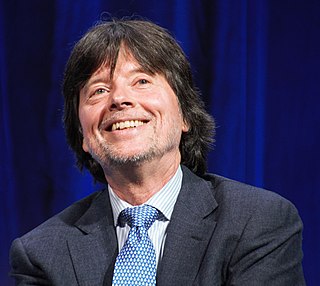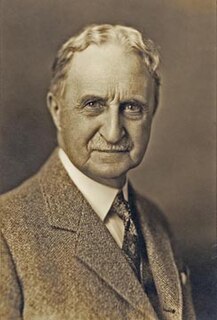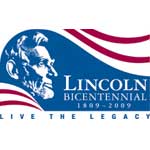
The Gettysburg Address is a speech that U.S. President Abraham Lincoln delivered during the American Civil War at the dedication of the Soldiers' National Cemetery in Gettysburg, Pennsylvania, on the afternoon of Thursday, November 19, 1863, four and a half months after the Union armies defeated those of the Confederacy at the Battle of Gettysburg. It is one of the best-known speeches in American history.

Kenneth Lauren Burns is an American filmmaker, known for his style of using archival footage and photographs in documentary films. His widely known documentary series include The Civil War (1990), Baseball (1994), Jazz (2001), The War (2007), The National Parks: America's Best Idea (2009), Prohibition (2011), The Roosevelts (2014), The Vietnam War (2017), and Country Music (2019). He was also executive producer of both The West, and Cancer: The Emperor of All Maladies.

The Civil War is a 1990 American television documentary miniseries created by Ken Burns about the American Civil War. It was first broadcast on PBS on five consecutive nights from September 23 to 28, 1990. More than 39 million viewers tuned in to at least one episode, and viewership averaged more than 14 million viewers each evening, making it the most-watched program ever to air on PBS. It was awarded more than 40 major television and film honors. A companion book to the documentary was released shortly after the series aired.

Andrew Gregg Curtin was a U.S. lawyer and politician. He served as the Governor of Pennsylvania during the Civil War.

The Gettysburg National Military Park protects and interprets the landscape of the 1863 Battle of Gettysburg during the American Civil War. Located in Gettysburg, Pennsylvania, the park is managed by the National Park Service. The GNMP properties include most of the Gettysburg Battlefield, many of the battle's support areas during the battle, and several other non-battle areas associated with the battle's "aftermath and commemoration", including the Gettysburg National Cemetery. Many of the park's 43,000 American Civil War artifacts are displayed in the Gettysburg Museum and Visitor Center.

Dermot Mulroney is an American actor, musician, and voice actor. He is best known for his roles in romantic comedy, western, and drama films. Appearing on screen since the mid-1980s, he is known for his work in films such as Young Guns (1988), Staying Together (1989), Where the Day Takes You (1992), Point of No Return (1993), Angels in the Outfield (1994), My Best Friend's Wedding (1997), About Schmidt (2002), The Wedding Date (2005), August: Osage County (2013), Insidious: Chapter 3 (2015), and the HBO films The Last Outlaw (1993) and Long Gone (1987). Mulroney played the main antagonist Francis Gibson in NBC's Crisis, Dr. Walter Wallace in Pure Genius, Sean Pierce in Showtime's Shameless and Bobby Sheridan in USA's The Purge.

William Roedel Rathvon, CSB,, sometimes incorrectly referred to as William V. Rathvon or William V. Rathbone, is the only known eyewitness to Abraham Lincoln's Gettysburg Address, of the over 10,000 witnesses, to have left an audio recording describing that experience. He made the recording in 1938, a year before his death. A graduate of Franklin and Marshall College in Lancaster, Pennsylvania, and a successful businessman, he became a practitioner of Christian Science healing, served as a public lecturer, Church treasurer and director of The First Church of Christ, Scientist in Boston, Massachusetts. He was treasurer from 1911 until he was elected to the Church's Board of Directors, on which he served from 1918 until his death in 1939. From 1908 to 1910 he was correspondence secretary for Christian Science founder Mary Baker Eddy. He also authored "The Devil's Auction" often republished without attribution as "The Devil's Garage Sale".
David McConaughy was a noted attorney, state senator, cemetery president, and civic leader in Gettysburg, Pennsylvania, as well as a part-time intelligence officer for the Union Army during the American Civil War. He was a driving force behind the creation of the Gettysburg National Cemetery following the Battle of Gettysburg. He also led early efforts to preserve the Gettysburg Battlefield for future generations.

Since his death in 1865, Abraham Lincoln has been an iconic American figure depicted—usually favorably or heroically—in many forms. Lincoln has often been portrayed by Hollywood, almost always in a flattering light.
Gabor S. Boritt is an American historian. He was the Robert Fluhrer Professor of Civil War Studies and Director of the Civil War Institute at Gettysburg College. Born and raised in Hungary, he participated as a teenager in the Hungarian Revolution of 1956 against the Soviet Union before escaping to America, where he received his higher education and became a scholar of Abraham Lincoln and the American Civil War. He is the author, co-author, or editor of 16 books about Lincoln or the War. Boritt received the National Humanities Medal in 2008 from President George W. Bush.

Allen Carl Guelzo is an American historian who serves as the Henry R. Luce III Professor of the Civil War Era at Gettysburg College, where he serves as Director of the Civil War Era Studies Program.

The Abraham Lincoln Bicentennial Commission (ALBC) was the Congressionally created 14-member federal commission focused on planning and commemorating the 200th birthday of the United States' 16th president on February 12, 2009. The commission served for ten years, from 2000 to 2010. Its official successor organization, announced in 2011 with an expanded board and broadened mission, is The Abraham Lincoln Bicentennial Foundation.

David Wills was the principal figure in the establishment of the National Cemetery at Gettysburg, Pennsylvania. As a result of his efforts, the Gettysburg Address was given by Abraham Lincoln. Wills was Lincoln's host while in Gettysburg, and the Gettysburg Address was completed in the large upstairs bedroom occupied by the President during his brief stay in the town.

Harold Holzer is a scholar of Abraham Lincoln and the political culture of the American Civil War Era. He serves as director of Hunter College's Roosevelt House Public Policy Institute. Holzer previously spent twenty-three years as senior vice president for public affairs at The Metropolitan Museum of Art in New York before retiring in 2015.
Alexander Bliss was assistant quartermaster general of the Union forces and a colonel in the United States Army during the American Civil War. His father, also named Alexander, died before he was born; and his mother, Elizabeth Davis Bliss, later married George Bancroft, the eminent American historian.

The Consecration of the Soldiers' National Cemetery was the ceremony at which U.S. President Abraham Lincoln delivered the Gettysburg Address on November 19, 1863. In addition to the 15,000 spectators, attendees included six state governors: Andrew Gregg Curtin of Pennsylvania, Augustus Bradford of Maryland, Oliver P. Morton of Indiana, Horatio Seymour of New York, Joel Parker of New Jersey, and David Tod of Ohio. Reporters present included Joseph Gilbert, Charles Hale, John Russell Young ; and Cincinnati Commercial, New York Tribune, & The New York Times reporters.
The following outline is provided as an overview of and topical guide to Abraham Lincoln:

Everett School, also known as Davis Addition School, is a historic building located in Sioux City, Iowa, United States. Davis Addition School opened in 1888. It was named for the subdivision in which it was located. The original section of the building is composed of four rooms, and it cost $12,500 to build. It was renamed "Everett" in February of the following year, possibly after Edward Everett, the United States Senator from Massachusetts who gave the main speech at the Gettysburg National Cemetery dedication, the day that Abraham Lincoln delivered the Gettysburg Address. The gymnasium and additional classroom space was added in 1917. The auditorium was added in 1940, and the building has been modernized over the years. Both Everett and Smith Elementary schools were closed in 2011, with their students going to the new Liberty Elementary School. Arch Icon Development of Woodbine, Iowa acquired the building and is in the process of converting it into apartments. It was listed on the National Register of Historic Places in 2018.













